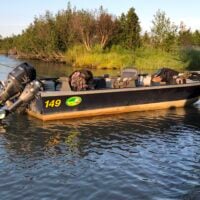Fishing guide Tom Neustrom said he believes a guide license in Minnesota would be beneficial because guides could help the Minnesota DNR with logging of fish on various lakes and make customers more comfortable that their guide is licensed for the trip. (Photo courtesy of Tom Neustrom)
Grand Rapids, Minn. — Minnesota, boasting more than 10,000 lakes, hosts myriad fishing guides who provide memorable excursions, often yielding noteworthy catches.
Tom Neustrom, a fishing guide with more than 40 years of experience, is advocating for a fishing guide license in the state, a measure already adopted by several Midwestern states. Neustrom’s conversations with fellow guides reveal widespread support for this initiative, suggesting a need for action from the Minnesota DNR.
“It brings out a lot of accountability to the guiding profession,” Neustrom said. “Most of the guys I know want it. They think it’s a great idea that ensures their clients that you’re licensed.”
While most favor the guide license, some do not, including Steve Carney, a veteran fishing guide of more than 40 years and Outdoor News columnist who argues that existing regulations suffice, deeming a guide license excessive.
Fishing Steve Carney says he’s opposed to creating a fishing guide license in Minnesota because he believes the industry is already regulated enough and that more is unnecessary. (Photo courtesy of Steve Carney)
“Personally, I don’t like the idea,” Carney said. “Mainly because we’re so regulated already, I just hate to see more regulation on top of that.”
Neustrom underscores the importance of training, suggesting that a guide license could reassure customers of a guide’s competence, including essential skills such as boat safety and medical preparedness.
Additionally, Neustrom advocates for requiring guides to carry liability insurance to mitigate risks inherent in fishing expeditions.
Carney acknowledges the necessity of liability insurance but contends that his extensive experience renders further training redundant.
“You got to have (liability insurance) or you’re going to lose your house if you do something stupid,” Carney said. “So, liability insurance is really important and I would go along with you have to have liability insurance in order to guide.”
Neustrom proposes that a guide license could mandate the submission of daily or weekly activity logs to the DNR, aiding the agency’s understanding of Minnesota’s water bodies.
As for cost, some states in the Midwest vary in price for licenses. For example, Wisconsin residents pay $40, while nonresidents pay $100. Michigan has residents pay $150 and nonresidents $300.
Neustrom said he thinks $100 per year for a guide license in Minnesota seems fair or within the $75 to $150 range. He added that if there’s more than 2,000 guides in the state at $100 per person, that’d be over $200,000 that could be stored in a separate fund and used for fisheries-related work.
Those fisheries-related work opportunities include stocking, surveying, studies, or even hiring new staff that focus on fisheries work. Regardless, Neustrom believes it’s time for the DNR to make the move and implement a guide license to benefit fisheries in the future.
“What we take from the resource every year, it’s well worth $100,” Neustrom said. “I mean, we take from the resource and we contribute our expertise on some situations, but I think $100 is not asking too much.”
DNR perspective
Brad Parsons, DNR Fisheries Section chief, said he’s intrigued in the guide license concept; however, the agency has yet to adopt an official stance.
Parsons said he spoke with Michigan about the transition that state made to guide licenses, and there was conversation surrounding the complexity of regulations for the industry.
Parsons highlights the potential benefits of guide licenses, particularly in enhancing the DNR’s knowledge of lakes and fish populations.
“You know these (guides) are good at what they do,” Parsons said. “Their perspective is really useful. They’re on the water a lot and they talk to people, both in state and nonresidents, and getting that sort of feedback that can really help us.”
He anticipates further discussions with stakeholders and plans to consult with counterparts in neighboring states. While the guide license debate has persisted for years, Neustrom urges decisive action to propel the initiative forward.
